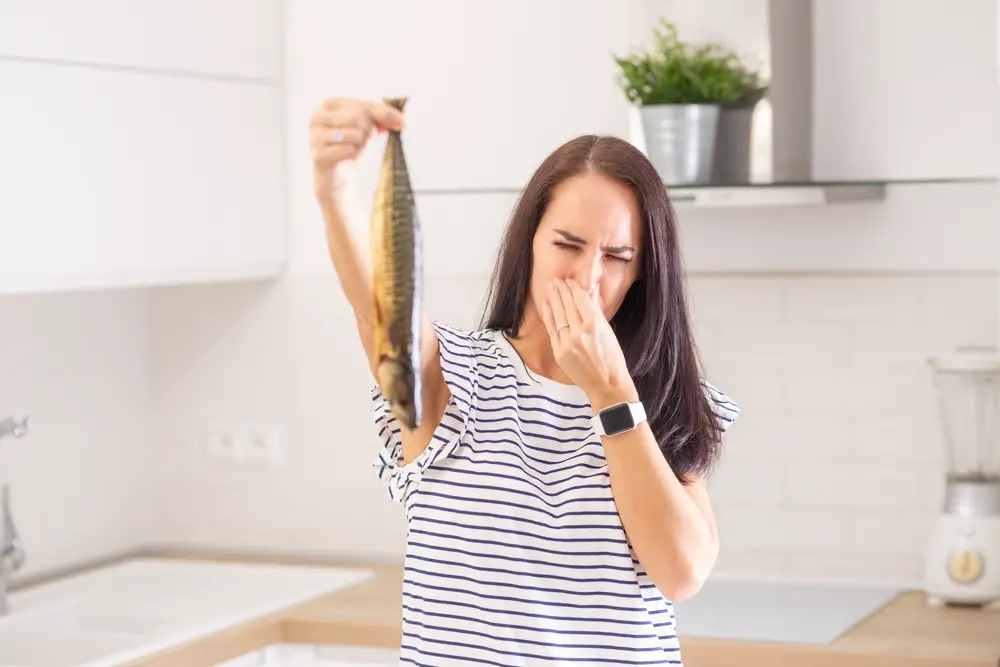Ladies, let’s talk about something that many of us have experienced but may not fully understand: the smell of our period blood. You may have noticed that sometimes it has a fishy odor, and you’re not alone in wondering why. Well, today we’re going to dive into the science behind why period blood can sometimes smell like fish. It’s important to know that while a certain level of odor is normal, a fishy smell could indicate an underlying issue that needs attention. So, let’s get to the bottom of this and shed some light on why this happens.
Contents
Why Does Period Blood Smell Like Fish?

Hormonal Changes
During your menstrual cycle, hormonal changes can affect the pH balance of your vagina. This can create an environment where certain bacteria can thrive, leading to an unpleasant odor. When the pH balance is disrupted, it can allow bacteria to grow and produce a fishy smell. This is especially common during your period when there is an increase in blood flow and moisture in the vaginal area.
Bacterial Overgrowth
Another reason why period blood may smell like fish is bacterial overgrowth. The vagina naturally contains bacteria, but when there is an overgrowth of certain types of bacteria, it can lead to an infection called bacterial vaginosis. This infection can cause a strong fishy odor, along with other symptoms such as itching, discharge, and a burning sensation during urination.
Bacterial vaginosis is usually caused by an imbalance in the vaginal pH, which can be influenced by factors such as douching, using scented products, or having multiple sexual partners. It’s important to note that bacterial vaginosis is not a sexually transmitted infection, but it can increase the risk of contracting other sexually transmitted infections.
If you notice a fishy smell during your period or at any other time, it’s important to consult with your healthcare provider. They can perform an examination to determine the cause of the odor and recommend appropriate treatment if necessary. Treatment for bacterial vaginosis typically involves antibiotics to restore the balance of bacteria in the vagina.
To prevent or reduce fishy odors during your period, there are a few things you can do:
- Change your sanitary products frequently to prevent the buildup of bacteria.
- Avoid using scented products in the vaginal area, such as douches or sprays, as they can disrupt the natural pH balance.
- Practice good hygiene by washing the external genital area with mild soap and water.
- Wear breathable underwear and avoid tight-fitting clothing that can trap moisture.
Remember, while a certain level of odor is normal during your period, a strong fishy smell may indicate an underlying issue. It’s always best to consult with your healthcare provider if you have any concerns or persistent odors that are affecting your daily life.
What Causes a Fishy Odor In Period Blood?
Bacterial Vaginosis
One possible cause of a fishy odor in period blood is a condition called bacterial vaginosis. Bacterial vaginosis occurs when there is an overgrowth of certain bacteria in the vagina. This can disrupt the natural pH balance of the vagina, leading to an unpleasant odor. It’s important to note that bacterial vaginosis is not a sexually transmitted infection, but it can increase the risk of contracting other STIs. If you notice a fishy smell during your period or at any other time, it’s important to consult with a healthcare provider for proper diagnosis and treatment. Antibiotics are typically prescribed to treat bacterial vaginosis.
Trapped Menstrual Blood
Another possible cause of a fishy odor in period blood is trapped menstrual blood. During your period, blood can sometimes get trapped in the folds of the vagina or in the cervix. This trapped blood can mix with bacteria and other substances, leading to a fishy smell. To help prevent this, it’s recommended to change your sanitary products frequently and ensure that they fit properly. Using tampons or menstrual cups that are the right size for your flow can help reduce the chances of blood getting trapped and causing an odor.
Poor Hygiene
Poor hygiene can also contribute to a fishy odor in period blood. If you don’t practice good hygiene during your period, bacteria can accumulate and cause an unpleasant smell. It’s important to clean the vaginal area regularly with mild soap and water. However, be cautious not to overwash, as this can disrupt the natural balance of bacteria in the vagina. Avoid using scented products in the vaginal area, as these can also disrupt the pH balance and lead to an odor. Additionally, wearing breathable underwear and avoiding tight-fitting clothing can help promote proper airflow and reduce the chances of bacteria growth.
Remember, if you notice a fishy odor during your period or at any other time, it’s always best to consult with a healthcare provider. They can provide a proper diagnosis and recommend the appropriate treatment to address the underlying cause of the odor. In the meantime, practicing good hygiene, changing sanitary products frequently, and wearing breathable underwear can help minimize the chances of a fishy odor in period blood.
How to Get Rid of Fishy Smell During Period?

Maintain Good Hygiene Practices
To combat the fishy smell during your period, it’s crucial to maintain good hygiene practices. Here are some tips to help you stay fresh and odor-free:
- Change your sanitary products frequently: It’s essential to change your pads or tampons regularly, ideally every 4 to 6 hours. This helps prevent the buildup of bacteria and reduces the chances of a fishy odor.
- Cleanse the vaginal area: When you change your sanitary products, make sure to cleanse the vaginal area with mild, unscented soap and warm water. Avoid using harsh soaps or strong fragrances, as they can disrupt the natural pH balance of your vagina and worsen the odor.
- Wipe from front to back: Always remember to wipe from front to back after using the toilet. This helps prevent the transfer of bacteria from the anal area to the vagina, reducing the risk of bacterial overgrowth and odor.
- Avoid douching: While it may be tempting to use douches or feminine sprays to mask the odor, they can actually do more harm than good. Douching disrupts the delicate balance of bacteria in the vagina and can lead to infections. Stick to gentle cleansing with plain water or mild soap instead.
Use Unscented Menstrual Products
Choosing the right menstrual products can make a significant difference in preventing and reducing the fishy smell during your period. Here’s what you should consider:
- Opt for unscented pads and tampons: Fragrance-free pads and tampons are your best bet when it comes to preventing odors. Scented products can irritate the sensitive skin in your vaginal area and worsen the fishy smell. Stick to unscented options to keep things fresh and odor-free.
- Consider menstrual cups: Menstrual cups are an excellent alternative to traditional pads and tampons. They are made of medical-grade silicone and collect the menstrual blood instead of absorbing it. Cups are odorless and can be worn for longer periods, making them a convenient and eco-friendly option.
Stay Hydrated and Eat a Healthy Diet
Believe it or not, your diet and hydration levels can impact the odor of your period blood. Here’s how you can make a difference:
- Stay hydrated: Drinking plenty of water helps flush out toxins from your body, including those that can contribute to the fishy smell. Aim to drink at least 8 glasses of water a day to stay hydrated and maintain a healthy vaginal environment.
- Eat a balanced diet: A healthy diet rich in fruits, vegetables, whole grains, and lean proteins can help maintain proper hormonal balance and reduce the risk of bacterial overgrowth. Avoid excessive consumption of processed foods, sugary snacks, and caffeine, as they can worsen the odor.
Remember, if the fishy smell persists or is accompanied by other symptoms such as itching, burning, or unusual discharge, it’s essential to consult with a healthcare provider. They can provide a proper diagnosis and recommend appropriate treatment options.
When to Seek Medical Attention

If you are experiencing a fishy smell during your period, it’s important to pay attention to your body and know when it’s time to seek medical attention. While a slight odor is normal, a strong and persistent fishy smell could indicate an underlying issue that requires further evaluation. Here are a few signs that you should consult with a healthcare provider:
- Persistent Fishy Odor: If the fishy smell continues even after practicing good hygiene and changing sanitary products frequently, it’s important to consult with a healthcare provider. They can help determine the cause of the odor and recommend appropriate treatment.
- Accompanying Symptoms: If you notice any other symptoms along with the fishy smell, such as itching, burning, unusual discharge, or pain, it’s essential to seek medical attention. These symptoms could be indicative of an infection or other underlying condition that needs to be addressed.
- Change in Menstrual Cycle: If you experience any sudden changes in your menstrual cycle, such as heavy bleeding, irregular periods, or prolonged bleeding, it’s important to consult with a healthcare provider. These changes could be a sign of an underlying hormonal imbalance or other medical condition.
- Recurrent Infections: If you have a history of recurrent vaginal infections, such as bacterial vaginosis or yeast infections, and notice a fishy smell during your period, it’s important to seek medical attention. Recurrent infections may require additional treatment or management strategies.
Remember, it’s always better to be safe than sorry. If you have any concerns or doubts about the fishy smell during your period, don’t hesitate to reach out to a healthcare provider. They can provide you with the necessary guidance and help ensure your reproductive health.
Final Words
To conclude, the fishy odor that can sometimes be present in period blood is usually caused by hormonal changes, bacterial overgrowth, or poor hygiene practices. Bacterial vaginosis, an overgrowth of certain bacteria in the vagina, can disrupt the pH balance and result in a fishy smell. Additionally, trapped menstrual blood in the folds of the vagina or cervix can mix with bacteria and create an odor. Maintaining good hygiene practices during menstruation, such as changing sanitary products frequently, using mild, unscented soap and warm water to cleanse the vaginal area, and wiping from front to back, can help combat the fishy smell. It is also advisable to avoid douching and consider using unscented menstrual products like pads and tampons or menstrual cups to prevent odors. Furthermore, staying hydrated and following a healthy diet can impact the odor of period blood. It is important to pay attention to your body and seek medical attention if the fishy smell persists or is accompanied by other symptoms. Remember, taking care of your hygiene and overall health is key to managing any unpleasant odors during your period.
Frequently Asked Questions
Will period blood show in the pool?
No, there is no need to worry as the volume of water in a pool is large enough to dilute any small amount of period blood that may escape, making it unlikely to be seen by other swimmers.
Can blood cause a fishy smell?
Yes, when menstrual blood mixes with bacteria in the vagina, it can develop a fishy odor. Just like how sweat has no odor, but when mixed with our body’s bacteria, it can create an unpleasant smell.
Why does my period blood smell weird?
Period blood stays in the vagina for a longer time, exposing it to vaginal bacteria, which can cause an odor. The amount of bacteria can fluctuate, leading to changes in the smell of period blood.
Can others smell my period?
Typically, period blood smells are not noticeable to other people. However, unusual smells during menstruation can be related to hygiene practices. Practicing good hygiene is one of the best ways to improve the smell.
Why do I smell myself through my pants?
Poor hygiene, such as not regularly bathing, can lead to strong smells through your clothes. Showering regularly and washing with mild soap and warm water can help reduce these effects.
I am a medical student with experience and interest in Women’s health and well-being.